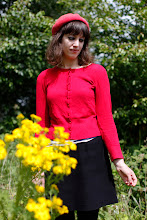 For music fans, especially festival-goers, gigs often involve standing in sticky, beer soaked venues. At Sounds from the Other City, however, Salford's annual celebration of alternative music and art, Chapel Street’s beautiful Sacred Trinity Church has long provided the equivalent to a chill out tent, where audiences can sit on the floor or bean bags and relax.
For music fans, especially festival-goers, gigs often involve standing in sticky, beer soaked venues. At Sounds from the Other City, however, Salford's annual celebration of alternative music and art, Chapel Street’s beautiful Sacred Trinity Church has long provided the equivalent to a chill out tent, where audiences can sit on the floor or bean bags and relax.Andy Salmon, music fan and reverend at Sacred Trinity, tried to go to Sounds from the Other City in its first year, but it was sold out. However, when the organisers said they needed more venues the next year he saw the perfect opportunity to get involved, offering Sacred Trinity as a stage. This year, Sacred Trinity’s bigger sister church, St Philip's, a little further along Chapel Street, which was put on Salford’s musical map when it hosted a show by Sugababes a couple of years ago, will be used instead.
Andy explains: “Churches have always put on gigs — even if they weren’t always rock gigs, but the divide between gigs in pubs and gigs in churches is not always as obvious or stark as some people make out. For example, the Wesley brothers wrote hymns based on popular tunes sung in pubs.” He continued: “Sugababes made people realise you can do gigs a mile from Manchester city centre. Psychologically, people had seen Salford as being too far.”
Members of Andy’s congregation volunteer at gigs, introducing a whole new audience to the music. Andy, a self-confessed beer snob who favours the ‘decent beer’ to be found at places like the Black Lion, King’s Arms, New Oxford and the Crescent, will be bringing in kegs of real ale from Bazens brewery in Higher Broughton, a mile or two away from the venue, and manning a hand pump himself.
There are bassy, loud gigs that rattle the stained glass windows, and one of Andy’s favourite bands is British Sea Power, but he admits the building is more suited to ambient, acoustic, folky music. “Sometimes sparse, electronic music that could be very dull if you were standing up in one of the academies is completely different experienced in a church.”
Bands also use the church for recording, taking advantage of the ‘big-space’ sound it provides, including Delphic, who put St Philip's' organ to use.
“The building can work with the artist. The human voice and guitar, singing into such a big space, can be really powerful. Churches were built with sound in mind so even unamplified sound, such as four unaccompanied human voices singing Russian folk songs, can fill the space in a wonderful way. When Florence and the Machine played they brought a rig with them that was far bigger than they needed as they were used to blasting out sound.”
“What I love is that there’s an interaction between the music and the building. There’s a history and feel to the building that comes from the fact that generations of people have used it. It reflects the hopes and dreams, and also the hurts and pains, of people. We celebrate all of human life here — baptisms, weddings, and funerals. The building has something else about it, and so does music — music connects in a way that often words don’t."
Chris Horkan, who promotes gigs under the name Hey! Manchester, and Oh Productions, and will be hosting a stage at the festival, has put gigs on at Sacred Trinity Church, St Philip's and Manchester Cathedral in the past. He explained: “Churches are not really used as venues despite them being some of the best venues in the city and a lot more memorable than a black box room. Fans like the novelty. Most of the people who go to gigs probably haven’t been in a church for years and so many people who live in Manchester have never been in the Cathedral, even though it’s one of the most iconic buildings in Manchester and it’s such a big, imposing place.” However, there are some downsides for promoters: “They can be quite unpredictable — having a choir come in to practice when you didn’t expect it, for example!”
Revenue raised from putting concerts on means that the building can continue to be used for future generations, bands benefit from the acoustics and both music fans and church volunteers are introduced to experiences they might not have otherwise had — using churches for music is a win-win for everyone.
Read Reverend Andy's blog about Salford, the church and bands he's seen.
This is an extract from 'The Shrieking Violet presents: Sounds from the Other City' festival programme, which will follow soon!
Sounds from the Other City festival of music and art takes places at various venues on Sunday May 2 and costs £15 (tickets available from Islington Mill, Piccadilly Records and Quay Tickets).
www.soundsfromtheothercity.com




No comments:
Post a Comment